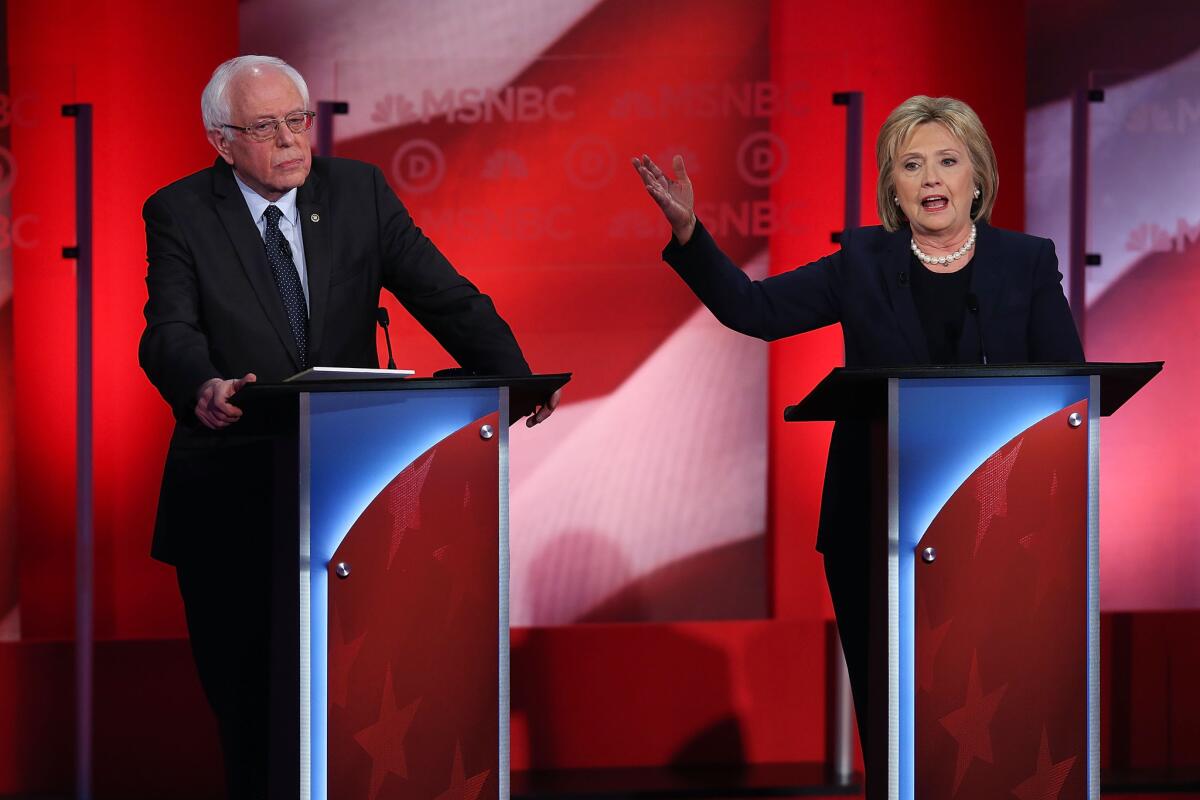Labels, smears and other takeaways from the Democratic debate

Bernie Sanders and Hillary Clinton in their New Hampshire debate.
- Share via
Hillary Clinton, the former secretary of State, and Bernie Sanders, the Vermont senator, held their first one-on-one debate Thursday, and the last one before the New Hampshire Democratic primary next week. Sanders has a large lead in New Hampshire, but Clinton remains the national front-runner, leaving both sides eager to win over new voters.
Here are a few things we noticed:
Labels, labels, labels
Labels have become the defining battle for Democrats, whose struggle for the soul of their party has emerged as a counterpoint to the louder debate among Republicans. What is a progressive? Can a democratic socialist represent Democrats’ ideals? Is the European model superior?
Clinton repeated her oft-used credo, “a progressive who gets things done.” But she added a definition -- “a progressive is someone who makes progress” -- intended to put down Sanders as an unrealistic dreamer and elevate herself as a planner.
Clinton’s central argument, that her opponent is too much of an idealist, is a hard one to sell on the campaign trail, especially to liberals. It’s a big reason she has had a hard time attracting younger voters who have flocked to Sanders. But it would be hard, and damaging in the general election, for her to try to get to the left of Sanders, even as she inches toward him.
Sanders, for his part, conceded that President Obama is a progressive, though “I disagree with him on a number of issues,” including the Pacific trade pact he negotiated, a reminder that he will not cede the left to anyone.
TRAIL GUIDE: All the latest news on the 2016 presidential campaign >>
'It's time to end the very artful smear'
Clinton raised her voice against Sanders in what may have been the most dramatic moment in the debate.
"I really don’t think these kind of attacks by insinuations are worthy of you,” she added. “If you’ve got something to say, say it directly."
Clinton showed her frustration with the Sanders campaign, which has continually put her on the defensive for her close relationship with Wall Street, including six-figure speaking fees she received from Goldman Sachs. (Clinton declined to commit to releasing transcripts of her paid speeches, saying she would look into it.)
It was an attempt by Clinton to return to her strength, playing defense and talking about the scars she has from the attacks she has withstood for a quarter of a century in national politics.
Experience versus Iraq vote
Sanders has not had much to say about foreign policy, sticking mostly to his message about Wall Street and the domestic economy.
When asked to define his policy, his case was pretty simple: He may not have as much experience as Clinton, but he voted against the war in Iraq.
Clinton is hoping she is finally done repenting for her vote, which helped cost her the 2008 election. And she had a pretty good retort to Sanders: “A vote in 2002 is not a plan to defeat ISIS.”
NEWSLETTER: Get the best from our political teams delivered daily
Clinton tries to put the emails behind her, with help from Sanders
Clinton said she was “100% confident” that the FBI review of her private email would not yield any political problems, though the situation may no longer be in her control. She tried to cast the issue as part of a longer-term effort by Republicans to undermine her, a defense that has not put the issue to rest.
Sanders -- who famously said during an October debate that “the American people are sick and tired of hearing about your damn emails" – once again refused to bite.
“There’s not a day that goes by where I am not asked to attack her on that issue and I have refrained from doing that,” Sanders said.
The general election will be far different
Voters on both sides of the aisle may be angry. But other than a fear of terrorism, the Democrats have vastly different views from Republicans about what is ailing America. Sanders and Clinton agreed that the water crisis in Flint, Mich., was a prime example of the government failing its people. They railed against Republicans for failing to address immigration and climate change.
The outlook was far different from Republican debates, which focus on the size of government, the lack of immigration enforcement, and the cost of regulations to American jobs.
Follow me @noahbierman on Twitter.
ALSO
Why young feminists are choosing Bernie Sanders over Hillary Clinton
Sanders and Clinton clash in debate on foreign policy, progressivism
Latinos turned out in Iowa in record numbers, poll indicates
Get the L.A. Times Politics newsletter
Deeply reported insights into legislation, politics and policy from Sacramento, Washington and beyond. In your inbox three times per week.
You may occasionally receive promotional content from the Los Angeles Times.








